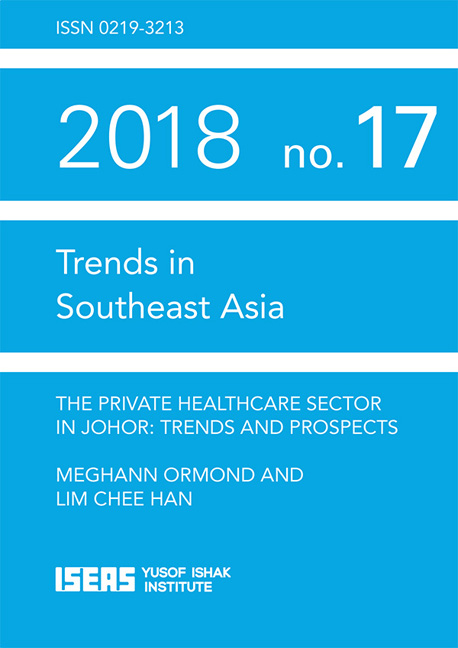The Private Healthcare Sector in Johor: Trends and Prospects
Published online by Cambridge University Press: 25 August 2018
Summary
Introduction
The Iskandar Malaysia (IM) special economic zone (SEZ) was established in Malaysia's southernmost state, Johor, in 2006 and is now beginning its third and final phase of development, with a targeted completion in 2025. IM is jointly operated and regulated by the Malaysian federal government and Johor state government under the statutory body called Iskandar Regional Development Authority (IRDA), which is charged with the development of IM as a “strong and sustainable metropolis of international standing” (IRDA 2016a). To do this, IRDA focuses on economic sector and infrastructural planning, the promotion of IM to the general public and potential investors, and coordinating and facilitating investment in the SEZ. It promotes nine economic sectors within IM: healthcare, financial and business services, tourism, education, logistics and creative services make up the service sector, while electrical and electronics, petrochemical and oil and gas, and food and agro-processing comprise the manufacturing sector. From IM's inception in 2006 to mid-2016, the manufacturing sector (27 per cent), retail/mixed-development (26 per cent) and residential property segments (20 per cent) comprised the bulk of investment in IM, with the services sector accounting for only 8 per cent during that period (IRDA 2016a, p. 64). Healthcare made up only 1 per cent of total investment, or RM3.16 billion, in the same period (IRDA 2016a, p. 65).
Despite its relative insignificance in the SEZ's broader investment portfolio, healthcare — a driver for other health-related industries (e.g., biotechnology, medical devices and equipment, pharmaceuticals and education) — has been thought to be a more solid and steadier growth catalyst over the last decade than other projects that IRDA initially saw as significant growth catalysts (Whang and Lim 2016). This is due in part to healthcare, like schools and transport infrastructure, functioning as a key infrastructural anchor and “enabler” to render retail/mixed-development and residential property development more attractive to investors and consumers.
In the following pages, we provide a contemporary snapshot of the key policies and players shaping the development of private healthcare in Johor in order to inform policymakers, current commercial stakeholders and potential investors, and residents and civil society actors in the region about the latest trends, concerns and opportunities linked to the private healthcare sector in Johor.
- Type
- Chapter
- Information
- The Private Healthcare Sector in JohorTrends And Prospects, pp. 1 - 40Publisher: ISEAS–Yusof Ishak InstitutePrint publication year: 2018

